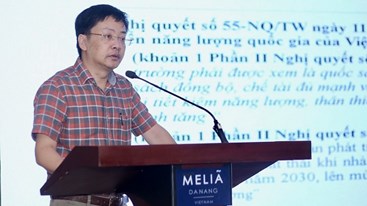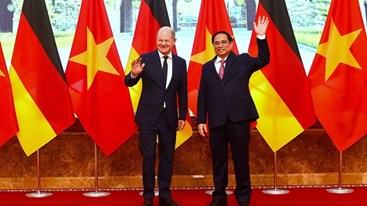Development of renewable energy requires large capital investment, and therefore, needs close cooperation between the state and private sectors. This cooperation model has been applied in many countries across the world including Vietnam.
Experience of renewable energy in developed countries
According to US-based Pacific Northwest National Laboratory senior science officer Dr. Cary Bloyd, renewable energy development experiences in developed countries show that the role of government is important in the development of these projects, particularly in attracting private investment. Government can play a role in helping businesses with sponsored loans, tax incentives, and preferential land rents to make them for attractive.

In the Federal Republic of Germany, investors and producers who use solar power will receive government support. German people that use solar batteries for 20 years will receive cash incentive. Solar power producers are guaranteed to be able to sell output power at 50 cents per kWh while power prices in Germany are currently 20 cents per kWh. Since the German Renewable Energy Act took effect, German renewable energy developers have become more secure because they can receive more incentives. According to the act, renewable power is prioritized in the national grid and is sold at stable prices which are higher than the market prices for at least 20 years to ensure a profit. Private investors in renewable energy power plants will receive year-on-year reduced state financial support.
In some Chinese localities, the Chinese Government has supported solar power development via supporting local enterprises and people in terms of research and manufacturing costs of solar water heaters so that their prices are equal to their common alternatives. Moreover, the government also supported the promotion of this type of water heater and required that the device be installed in all buildings in these localities. Thanks to that drastic solution solar water heaters are now used in 90 percent of these localities.
Vietnam’s initial renewable energy successes
In Vietnam, initial steps in promoting the use of renewable energy has been boosted via specific development objectives and schedules in the Power Plan VII. According to this plan, wind energy, which is considered the most important source of power generation, will be developed from the current negligible amount up to about 1,000MW by 2020 and 6,200MW by 2030. Wind power production is to account for 0.7 percent of total energy production by 2020 and 2.4 percent by 2030. In addition, wind power will be the only renewable energy source to receive a government subsidy of 7.8 US cents per kWh (6.8 US cents paid by Vietnam Electricity and the remaining 1 US cent paid by the Vietnam Environmental Protection Fund).
Director of Institute for Energy’s Center for Renewable Energy and Clean Development Mechanism Nguyen Duc Cuong said “The Bac Lieu Wind Power Plant has received a government guarantee to get loans from the US Export-Import Bank for the implementation of the project. The project will be loaned about 70 percent of the total investment for the first phase and 85 percent for the second phase. The first phase of this project was completed last month.”
More powerful renewable energy solutions necessary
According to Nguyen Duc Cuong, a Bac Lieu wind power project is so far the only renewable energy development project to receive a government guarantee. Government support is extremely important to attract private investment into development as most renewable energy projects require huge investment capital and cannot just rely on state investment. “In the coming time, we hope there will be more renewable energy projects receiving government-supported loans like the Bac Lieu Wind Power Project,” Cuong said.
According to renewable energy experts, Vietnam’s current coal and power pricing mechanism is the largest obstacle to renewable energy development. Therefore, in addition to building a favorable pricing mechanism for such projects, creating a transparent energy market is key to attracting private investors into renewable energy development in Vietnam.
Apart from wind power projects, other projects related to biomass, biogas, and solar energy have also received attention from the Ministry of Industry and Trade in terms of incentives. However, renewable energy in developed countries has taken decades to get the results seen today; so the Vietnamese Government should rapidly and intensively support Renewable energy development projects to get the same results.
By My








.png?w=367&h=206&mode=crop)
 EOI Extension (#3): C2.2.2: Review and update for current EE benchmarking for 2 sub-industrial sectors
EOI Extension (#3): C2.2.2: Review and update for current EE benchmarking for 2 sub-industrial sectors
 National Conference on Energy Efficiency and Conservation 2024
National Conference on Energy Efficiency and Conservation 2024
.jpg?w=367&h=206&mode=crop) Technical Consultation on Energy Usage Standards Amendment in the Steel Industry
Technical Consultation on Energy Usage Standards Amendment in the Steel Industry
.jpg?w=367&h=206&mode=crop) Paper Industry's Efforts to Save Energy
Paper Industry's Efforts to Save Energy
 Enhancing Awareness of Energy Management Systems and System Optimization
Enhancing Awareness of Energy Management Systems and System Optimization
 Efficient and Economical Energy Use in Wood Production
Efficient and Economical Energy Use in Wood Production
 Launching "Accelerating Innovative Startups for Energy Efficiency Competition"
Launching "Accelerating Innovative Startups for Energy Efficiency Competition"